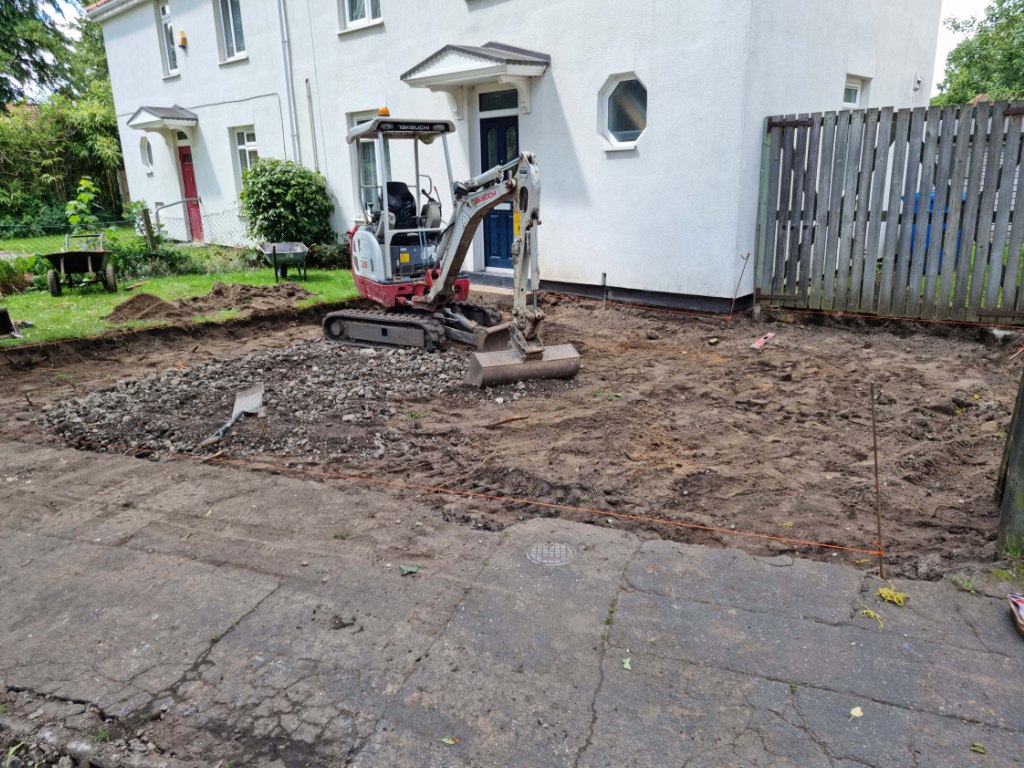Resin Bound Patios vs. Traditional Paving: A Comparison
Introduction: When choosing the right material for your driveway or patio, the decision often comes down to comparing resin-bound surfaces with traditional paving options like concrete, asphalt, and block paving. Each material has its benefits and limitations, and understanding these can help you make an informed decision that suits your specific needs. This blog post, brought to you by Towcester Driveways & Patios, compares resin-bound patios and traditional paving methods to guide homeowners’ landscaping choices.
What is Resin Bound Paving?
Resin-bound paving is a system that combines clear resin with natural aggregate stones to form a smooth, durable surface. The mixture is troweled down to create a flat finish that is permeable and compliant with Sustainable Urban Drainage Systems (SUDS) regulations.
Comparison Factors
- Aesthetics
- Resin Bound: Offers a highly customisable appearance with various colours and aggregates. The finished surface is smooth and modern, with a seamless finish that enhances the curb appeal.
- Traditional Paving: Includes various materials such as concrete slabs, asphalt, and block paving. Each has a distinct look, but seams and joints are more apparent, which can disrupt the visual flow of the space.
- Permeability
- Resin Bound: Naturally permeable, allowing water to drain through the surface and into the ground. This helps manage puddles and reduces surface water runoff, preventing flooding.
- Traditional Paving: Most options, like concrete and asphalt, are non-permeable, requiring additional drainage solutions to manage water runoff. Permeable versions of traditional materials are available but can be more expensive.
- Durability and Maintenance
- Resin Bound: Extremely durable and requires little maintenance. It does not loosen over time as it is a bound system, and the UV-stable resin helps prevent colour fading.
- Traditional Paving: Durability varies by material. Block paving can shift and may require repositioning or re-sanding to fill gaps. Concrete can crack in freezing temperatures, and asphalt may need resealing or patching.
- Installation
- Resin Bound: Installation is quick but must be carried out by professionals to ensure the resin sets properly without any errors. The base preparation is crucial to avoid cracks and ensure longevity.
- Traditional Paving: Depending on the material, traditional paving can sometimes be a DIY project. However, professional installation is recommended for optimal results, especially for larger areas.
- Cost
- Resin Bound: Generally more expensive initially due to the cost of materials and the need for professional installation. However, lower maintenance costs and durability can make it cost-effective over time.
- Traditional Paving: The initial cost can vary widely depending on the material chosen. Concrete is generally cheaper than resin-bound, but block paving and high-quality slabs can be similarly priced.
- Environmental Impact
- Resin Bound: More environmentally friendly due to its permeability and the use of natural materials. It supports sustainable urban drainage systems by allowing water to permeate through.
- Traditional Paving: Generally less environmentally friendly, especially impervious materials contributing to runoff and flooding. Some materials, like asphalt, also have a higher carbon footprint during production.
Conclusion: Choosing between resin-bound patios and traditional paving depends on various factors, including aesthetics, budget, maintenance, and environmental impact. Resin-bound offers a modern, durable solution with excellent permeability and low maintenance, making it an ideal choice for homeowners looking for a long-term, sustainable option. Traditional paving, while sometimes more affordable upfront, can require more maintenance and may not offer the same environmental benefits.
Call us on: 01327 225 196
Click here to find out more about Towcester Driveways & Patios
Click here to complete our contact form and see how we can help with your driveway needs.

